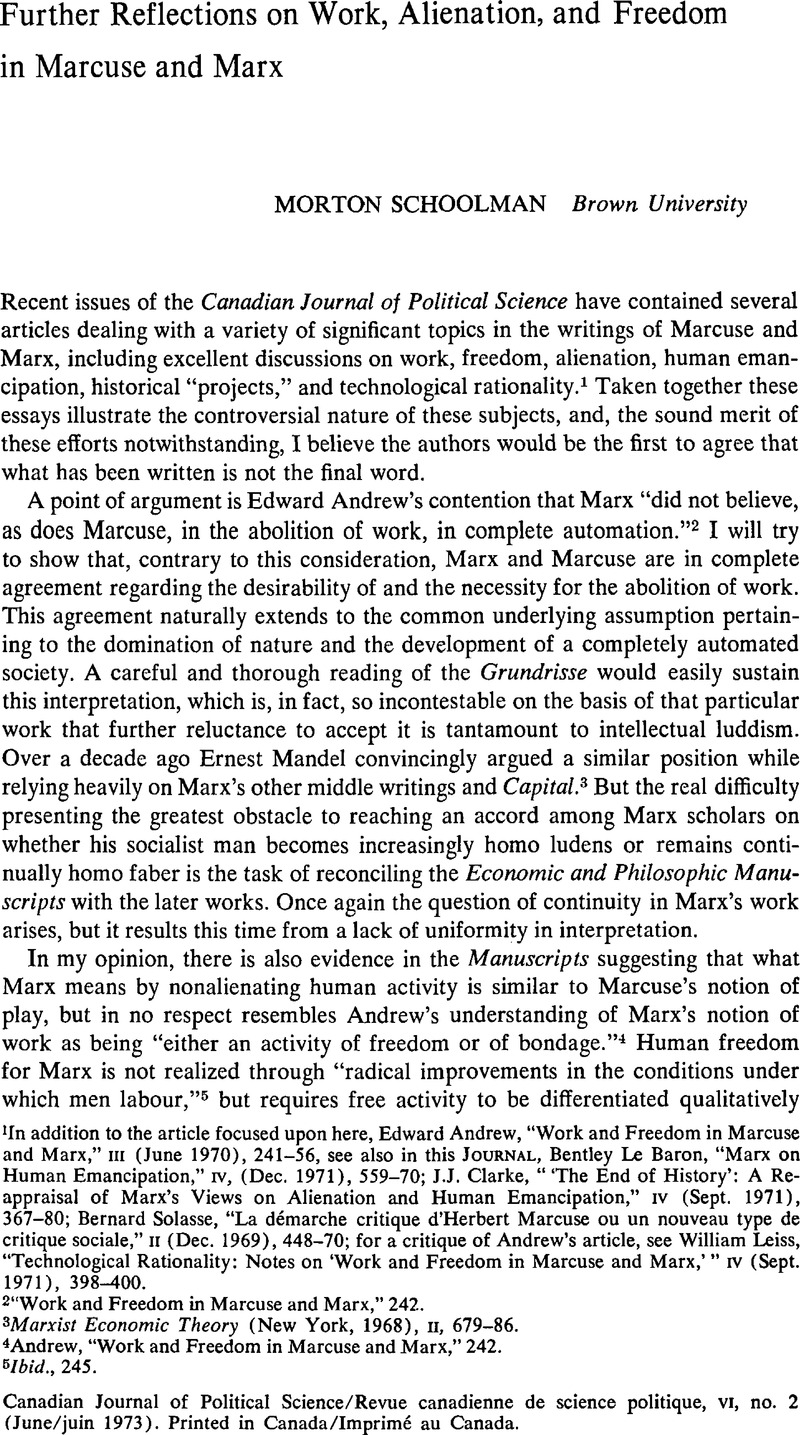Article contents
Further Reflections on Work, Alienation, and Freedom in Marcuse and Marx
Published online by Cambridge University Press: 10 November 2009
Abstract

- Type
- Articles
- Information
- Canadian Journal of Political Science/Revue canadienne de science politique , Volume 6 , Issue 2 , June 1973 , pp. 295 - 302
- Copyright
- Copyright © Canadian Political Science Association (l'Association canadienne de science politique) and/et la Société québécoise de science politique 1973
References
1 In addition to the article focused upon here, Andrew, Edward, “Work and Freedom in Marcuse and Marx,” III (June 1970), 241–56Google Scholar, see also in this Journal, Baron, Bentley Le, “Marx on Human Emancipation,” IV, (Dec. 1971), 559–70Google Scholar; Clarke, J.J., “‘The End of History’: A Reappraisal of Marx's Views on Alienation and Human Emancipation,” IV (Sept. 1971), 367–80Google Scholar; Solasse, Bernard, “La démarche critique d'Herbert Marcuse ou un nouveau type de critique sociale,” II (Dec. 1969), 448–70Google Scholar; for a critique of Andrew's article, see Leiss, William, “Technological Rationality: Notes on ‘Work and Freedom in Marcuse and Marx,’” IV (Sept. 1971), 398–400.Google Scholar
2 “Work and Freedom in Marcuse and Marx,” 242.
3 Marxist Economic Theory (New York, 1968), II, 679–86.
4 Andrew, “Work and Freedom in Marcuse and Marx,” 242.
5 Ibid., 245.
6 Brown, Norman O., Life Against Death (Middletown, Conn. 1970), 17.Google Scholar
7 (New York, 1972), 19.
8 Marx, Karl, Economic and Philosophical Manuscripts of 1844, (London, 1959)Google Scholar, quoted in Arthur, ibid., 19.
9 Marx, Early Writings, 133 (italics added in last line).
10 Ibid., 127.
11 Ed. R. Pascal (New York, 1967), 16.
12 Marx, Early Writings, 167.
13 Ibid., 128.
14 Andrew, “Work and Freedom in Marcuse and Marx,” 244.
15 Marx's Concept of Man (New York, 1971), 34.
16 See, ibid., 42; Avineri, Shlomo, The Social and Political Thought of Karl Marx (London, 1968), 231CrossRefGoogle Scholar; Schaff, Adam, Marxism and the Human Individual (New York, 1970), 186Google Scholar, and fn. 7, under “Endnotes,” pp. 267–68; Marcuse, Herbert, Reason and Revolution (Boston, 1968), 278–79.Google Scholar
17 International Publishers ed. (New York, 1970), I, 487–88.
18 The term Protean is not being employed as a surrogate for species-being. I have resorted to the use of metaphor to clearly illustrate and to emphasize the autonomous character of human freedom in Marx, as opposed to its social character, which is more properly distinguished by “species-being,” “species life,” or “species-consciousness.” See Bottomore's fn. 2 in his edition of Early Writings, 13.
19 Marx, Early Writings, 125 (italics added in the last line).
20 Capital, I, 408.
21 Ibid., 441 (italics added). Note, too, in this passage, the deliberate equation between “machinery” (automation), “setting free” the workman, and freedom from providing for a “means of subsistence.” In other words, automation under communism or socialism becomes singularly responsible for man's liberation from utilitarian labour.
22 Marx, and Engels, , Communist Manifesto, ed. Beer, Samuel (New York, 1955), 18.Google Scholar
23 Marx, Capital, I, 429.
24 Ed. and tr. David McLellan (New York, 1971), 75–6.
25 Marcuse, Herbert, Eros and Civilization (New York, 1962), 171.Google Scholar
26 Ibid., 162 (italics added).
- 2
- Cited by


